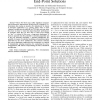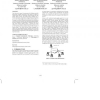19 search results - page 3 / 4 » The effect of collusion in congestion games |
MOBIHOC
2004
ACM
14 years 3 months ago
2004
ACM
In third generation (3G) wireless data networks, repeated requests for popular data items can exacerbate the already scarce wireless spectrum. In this paper we propose an architec...
INFOCOM
2012
IEEE
12 years 7 days ago
2012
IEEE
Cognitive radio gives users the ability to switch channels and make use of dynamic spectral opportunities. However, switching channels takes time, and may disrupt the quality of a...
TON
2010
13 years 8 months ago
2010
Abstract— Short TCP flows may suffer significant responsetime performance degradations during network congestion. Unfortunately, this creates an incentive for misbehavior by cl...
ACMACE
2005
ACM
14 years 3 months ago
2005
ACM
Over the past few years, the prominence of multiplayer network gaming has increased dramatically in the Internet. The effect of network delay (lag) on multiplayer network gaming h...
WIOPT
2010
IEEE
13 years 8 months ago
2010
IEEE
—Cognitive radio networks provide the capability to share the wireless channel with licensed (primary) users in an opportunistic manner. Primary users have a license to operate i...


